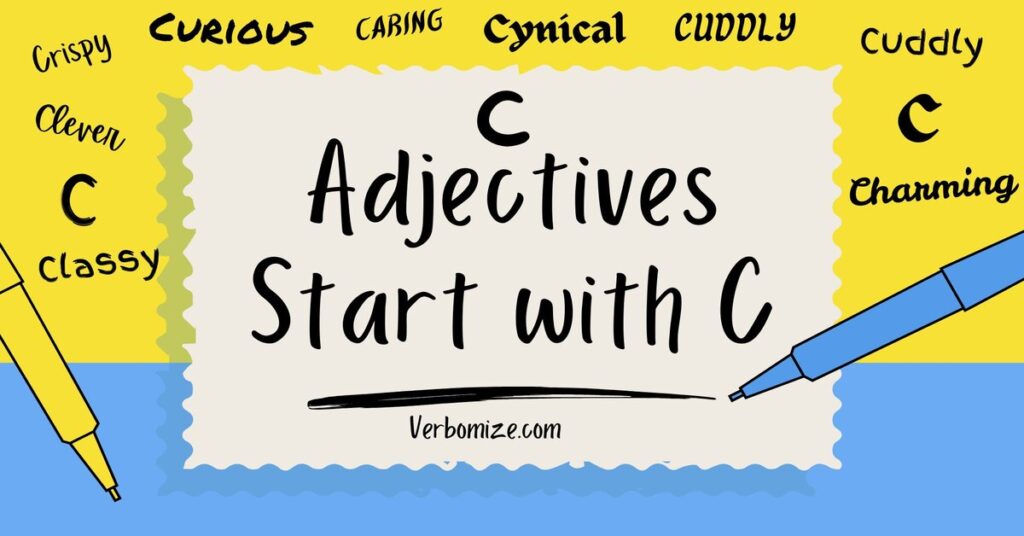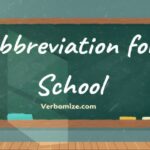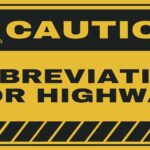Adjectives that start with C can transform your writing, making it more vivid, engaging, and expressive. Whether you’re a writer, student, or just someone looking to spice up your language, these powerful words offer endless possibilities to enhance your communication. Imagine describing something as charming instead of just nice or crisp instead of clear – it makes all the difference!
In this article, you’ll discover a curated list of captivating adjectives that begin with C. From calm to captivating, you’ll learn how to use them to make your sentences stand out. Want to elevate your writing? Keep reading!
positive adjectives start with c
We all appreciate words that reflect positivity and joy. Here are some adjectives starting with “C” that can help you express admiration, joy, or affection.
- Caring: Someone who shows kindness and concern for others.
- Charming: Delightfully pleasing or attractive, often in a way that wins others over.
- Clever: Quick-witted and inventive, able to solve problems creatively.
- Compassionate: Showing deep sympathy and concern for others’ misfortunes.
- Credible: Believable or trustworthy, deserving of confidence.
- Curious: Eager to learn or discover new things.
- Comfortable: Providing physical ease or emotional relaxation.
- Classy: Stylish, elegant, and sophisticated in manner or appearance.
These adjectives can be used in a variety of contexts, whether you’re describing a person’s personality or giving a positive review of an experience.
Descriptive Adjectives: Painting a Picture
When you need to vividly describe something or someone, these adjectives help create a clear and precise image in the reader’s or listener’s mind.
- Crisp: Clean, clear, and often refreshing in appearance or texture.
- Colorful: Full of vivid colors, bright and striking in appearance.
- Clear: Easy to see, hear, or understand; free from obstruction.
- Cold: Low in temperature, or emotionally distant.
- Chilly: Slightly cold, often used to describe a mildly uncomfortable temperature.
- Clumsy: Lacking coordination or grace; awkward in movement.
- Cylindrical: Shaped like a cylinder, long and round.
- Cloudy: Covered with or resembling clouds, often used to describe the sky or water.
- Cosmic: Relating to the universe; vast or immense in scale.
- Craggy: Rugged and uneven, often used to describe landscapes or terrain.
Using these adjectives allows you to transform ordinary descriptions into compelling imagery that captures the essence of what you’re communicating.
negative adjectives that start with c
While positivity is important, it’s equally essential to have adjectives that can articulate disapproval or negative traits. Here are some “C” adjectives that can help express disappointment, negativity, or undesirability.
- Cruel: Intentionally causing pain or suffering to others.
- Cynical: Distrusting or dismissive of others’ motives; often negative and skeptical.
- Corrupt: Morally degraded or dishonest, often involving bribery or fraud.
- Cheating: Dishonest or fraudulent, often used in the context of unfairly gaining an advantage.
- Crappy: Of poor quality or disappointing.
- Cluttered: Filled with an excessive amount of things, disorganized.
- Chaotic: Marked by complete disorder and confusion.
- Cold-hearted: Lacking compassion or empathy, emotionally indifferent.
- Contaminated: Made impure or harmful by contact with something else.
- Cringe-worthy: Evoking feelings of embarrassment or discomfort.
These adjectives are useful in expressing negative situations, personalities, or qualities. Use them carefully, as they often convey strong judgment or criticism.
Characteristic Adjectives: Defining Traits and Behaviors
When describing someone’s personality or an object’s features, these adjectives starting with “C” can help you pinpoint specific qualities or habits.
- Cautious: Being careful and prudent to avoid risks.
- Conscientious: Taking great care to do things well and thoroughly, especially when it comes to responsibility.
- Composed: Calm, self-controlled, and able to maintain poise in difficult situations.
- Chilly: Emotionally distant or reserved.
- Clever: Smart and quick-thinking, often showing creativity and ingenuity.
- Competitive: Eager to outperform others and achieve success.
- Consistent: Reliable and steady in actions or behavior.
- Carefree: Free from worries or responsibilities; lighthearted.
- Cautious: Prone to avoid danger or risks, taking deliberate actions.
These adjectives help define the specific attributes or behaviors of a person, object, or situation, giving you a precise way to describe them.
Fun and Interesting Adjectives: Adding Personality to Language
Language can be both fun and functional, and these adjectives are perfect for adding flair to your conversations or writing.
- Crispy: Having a crunchy or brittle texture, often used for food.
- Cheerful: Displaying a happy or optimistic demeanor.
- Cuddly: Soft and huggable; ideal for something or someone you want to snuggle with.
- Cosmic: Vast and mysterious, like the universe.
- Comical: Funny or humorous in an entertaining way.
- Chirpy: Cheerful and lively, often used to describe a person’s voice or demeanor.
- Charming: Delightful in a way that attracts or captivates.
- Comedic: Pertaining to comedy or humor.
- Chilled: Relaxed or laid-back, often in reference to a casual or carefree attitude.
- Crisp: Fresh and vibrant, especially when used to describe a refreshing sensation.
These adjectives are perfect for creating engaging, colorful language that will brighten any conversation or narrative.
Adjectives Describing Appearance: Shaping How We See the World
Appearance is often one of the first things we notice about a person, place, or thing. These adjectives can help you describe physical features and visual characteristics in greater detail.
- Chiseled: Having sharply defined features, often used to describe a well-defined jawline or body.
- Chunky: Thick, solid, or heavy in appearance, often used to describe clothing or physical form.
- Compact: Small in size but efficiently designed or built.
- Curvy: Having smooth, rounded shapes, often used to describe body types or objects.
- Charming: Attractive in an appealing and delightful way.
- Chaste: Simple, pure, or modest in appearance or style.
- Crinkled: Wrinkled or creased, often used to describe paper, fabric, or skin.
- Cumbersome: Heavy, awkward, or difficult to carry or manage.
- Cavernous: Large and hollow, like a cave.
- Clear-cut: Easily defined, without ambiguity; sharp and distinct.
These adjectives can help create vivid, visual descriptions that capture the essence of what you’re observing.
Adjectives Expressing Emotions: Conveying Inner Feelings
Emotions are key to how we engage with the world around us. These adjectives reflect a variety of feelings, from happiness to frustration.
- Content: Satisfied and at ease, without any desire for more.
- Conflicted: Torn between opposing feelings or decisions.
- Crushed: Overcome with sorrow, disappointment, or defeat.
- Chagrined: Feeling embarrassed or distressed due to failure or mistake.
- Composed: Calm and collected, especially under stress or pressure.
- Crestfallen: Disappointed and disheartened, often after a setback.
- Chipper: Cheerful and lively in mood or demeanor.
- Cynical: Distrusting of others’ motivations or goodness, often resulting in skepticism.
- Compliant: Willing to follow the wishes or rules of others without resistance.
- Curious: Eager to know or learn something, often driven by wonder or interest.
These adjectives will help you express the full range of human emotion in both writing and conversation.
Adjectives for Describing Actions: Bringing Movement to Life
Some adjectives do a fantastic job of describing the way things move or how actions are performed. These adjectives are perfect for adding dynamism to your writing or dialogue.
- Carefree: Acting without concern for consequences or responsibilities.
- Creeping: Moving slowly and stealthily, like something trying to remain undetected.
- Cavorting: Moving or jumping around in a playful, lively manner.
- Cautious: Taking care to avoid potential danger or mistakes.
- Creaking: Making a long, high sound due to strain or movement, often used for doors or floors.
- Climbing: Moving upward, often with effort or difficulty.
- Cowering: Crouching or shrinking back in fear or submission.
- Charging: Moving forward aggressively or forcefully.
- Crawling: Moving slowly, often on hands and knees.
- Crashing: Moving or falling forcefully, typically resulting in a loud noise or impact.
These action-oriented adjectives can help infuse energy into your descriptions, making them more vivid and engaging.
Adjectives Describing Personality: Defining Character Traits
Our personalities make us unique, and these adjectives are perfect for describing the attributes that define someone’s character.
- Chivalrous: Acting with honor, courtesy, and respect, especially towards others.
- Crafty: Skillful in achieving things through cleverness or deception.
- Caring: Showing kindness and concern for others.
- Condescending: Treating others as if they are inferior or unworthy.
- Cooperative: Willing to work together harmoniously with others.
- Credulous: Too willing to believe things, often without sufficient evidence.
- Compromising: Willing to settle differences by making concessions.
- Cold-hearted: Lacking compassion or empathy for others.
- Charismatic: Having a magnetic personality that draws others to you.
These adjectives offer insight into how people behave, think, and interact with the world, giving you a deeper understanding of character.
Adjectives for Describing Mood: Setting the Emotional Tone
Setting the right mood is crucial in any narrative, whether you’re writing a novel, giving a speech, or simply describing an atmosphere. These adjectives help convey different moods effectively.
- Cheerful: Bright, happy, and full of good spirits.
- Clouded: Unclear, often used to describe a confused or unsure mood.
- Chilly: Cold in manner, often implying an emotionally distant or unfriendly mood.
- Cordial: Warm, polite, and friendly in tone.
- Cumbersome: Difficult and awkward, often used to describe a heavy or burdensome situation.
- Contrary: Perverse, often going against what is expected or desired.
- Cold: Lacking warmth or affection, often indicating a detached or indifferent mood.
- Complacent: Satisfied with the current state of affairs, often to the point of being unaware of potential problems.
- Comical: Evoking amusement or laughter, light-hearted.
- Clammy: Uncomfortably damp or sweaty, often used to describe nervousness or discomfort.
These adjectives are valuable when setting a tone or mood in any narrative context, from writing to casual conversations.
Adjectives for Describing Time: Organizing and Characterizing Time
Time can be elusive, but these adjectives help us to describe moments and periods with clarity and precision.
- Contemporary: Relating to the present time or era.
- Cyclical: Occurring in cycles, repeating in a predictable pattern.
- Current: Happening or existing now; up to date.
- Chronological: Arranged in order of time.
- Constant: Happening continuously or regularly, without change.
- Civil: Relating to ordinary citizens or their government and legal rights, often used in a historical context.
- Clear-cut: Easy to understand or interpret in terms of timeframes or deadlines.
- Compressed: Reduced in duration or time span.
- Chronic: Persisting over time, often referring to something that continues for a long period or is recurring.
These time-related adjectives are especially helpful for managing and organizing concepts of time in writing or discussions.
Adjectives Describing Nature: Capturing the Beauty of the Environment
Nature is full of inspiring sights and sounds, and the following adjectives help you capture the essence of the natural world in vivid detail.
- Craggy: Rugged and uneven, often used to describe rocky terrain.
- Clear: Free of obstacles, such as in a clear sky or clear water.
- Cool: Refreshing, often describing pleasant weather or a gentle breeze.
- Cosmic: Relating to the universe or the vastness of space.
- Clammy: Damp, sticky, and often uncomfortable, used to describe humid weather or environments.
- Crispy: Fresh and dry, typically used for food, like crispy leaves or chips.
- Cavernous: Large and hollow, resembling a cave.
- Chilly: Slightly cold, often used to describe a crisp, fresh atmosphere or environment.
- Clement: Mild or temperate, especially in terms of weather.
- Cloudless: Having no clouds in the sky, often indicating bright, clear weather.
These adjectives are perfect for describing the various facets of nature, whether you’re narrating a scene or writing about the great outdoors.
Adjectives Describing Sound: Bringing Sound to Life
Sound is an integral part of our daily experience, and these adjectives help you convey auditory sensations with clarity and precision.
- Cacophonous: Harsh, jarring noise that is loud and unpleasant.
- Crisp: Clear and sharp, often used to describe a fresh or distinct sound.
- Chiming: Producing a clear, melodious sound, such as the ringing of a bell.
- Creaky: Making a long, high-pitched sound, like the squeak of a door or floorboard.
- Clattering: A loud, rattling noise, typically produced by objects hitting each other.
- Cooing: A soft, gentle sound, often made by doves or babies.
- Crackling: A series of sharp, popping noises, often associated with fire or static.
- Continuous: A sound that does not stop, uninterrupted or ongoing.
- Cheerful: A happy, lighthearted sound, often used to describe music or voices.
- Chirping: A short, sharp, high-pitched sound made by small animals or birds.
These adjectives bring auditory experiences to life, helping to vividly capture the sounds around us.
Adjectives for Describing Objects: Detail That Matters
Objects can be described in a multitude of ways, and the following adjectives starting with “C” give you even more tools to express their qualities.
- Colossal: Extremely large in size or scale.
- Cumbersome: Difficult to handle or manage due to size, weight, or complexity.
- Crafted: Skillfully made, often by hand.
- Compact: Small but well-constructed or efficient.
- Crisp: Fresh, firm, and clean in appearance or texture.
- Charming: Attractive in a delightful or pleasing way.
- Clunky: Large, awkward, or inefficient in design.
- Corroded: Damaged or worn away by chemical reactions, especially rust.
- Colorful: Full of vibrant colors, vivid and eye-catching.
- Cracked: Having a break or fracture, often indicating damage.
These adjectives are ideal for providing more detail when describing everything from everyday items to rare artifacts.
Adjectives Describing Mood or Atmosphere: Creating the Right Tone
The mood or atmosphere of a place, scene, or event is crucial for setting the tone, and these adjectives help you establish just the right feeling.
- Composed: Calm, controlled, and at peace, often used to describe a mood in a tense situation.
- Cordial: Warm and friendly, especially in interactions with others.
- Creepy: Causing fear or unease, often associated with eerie or unsettling surroundings.
- Calm: Peaceful and relaxed, evoking a sense of tranquility.
- Crummy: Poor, low-quality, or disappointing, often used to describe a negative atmosphere.
- Cheerful: Bright, happy, and lively, evoking positive emotions.
- Cold: Emotionally distant or unfriendly, creating a sense of detachment.
- Choked: Stifled, often used to describe an atmosphere full of tension or sadness.
- Crushed: Overcome with sadness or despair, typically after a failure.
- Contemplative: Reflective, thoughtful, and deep in thought, creating a serious or pensive mood.
These adjectives help you evoke particular feelings or settings, whether in storytelling, casual conversation, or analysis.
Adjectives Describing Time and Seasons: Navigating the Passage of Time
Time can be abstract, but these adjectives allow you to describe different periods and the changing of seasons in rich detail.
- Chronological: Arranged in the order of time.
- Current: Happening or existing at the present moment.
- Constant: Unchanging and consistent, often used in reference to time or conditions.
- Cyclical: Occurring in cycles, often used to describe events or seasons.
- Climate-controlled: Regulated in terms of temperature or environment, often used for buildings or storage.
- Climactic: Relating to the highest point of tension or drama, often used to describe moments in a story or event.
- Crucial: Critical or of great importance at a particular time.
- Curt: Brief, often abrupt or terse in communication.
- Capricious: Unpredictable, especially in reference to moods, seasons, or changes in behavior.
- Clement: Mild or temperate, often used to describe pleasant weather.
These adjectives are excellent for describing the passage of time, changes in seasons, or specific moments that hold significance.
Adjectives for Describing Actions and Behaviors: Understanding Movement and Decisions
Actions are a fundamental part of life, and these adjectives allow you to describe movements, behaviors, or decisions with precision.
- Chasing: Actively pursuing something or someone, typically in a determined manner.
- Chilling: Relaxing or unwinding in a calm, peaceful environment.
- Creeping: Moving slowly and quietly, often in a stealthy or cautious manner.
- Clambering: Climbing with difficulty or awkwardness, often on rough terrain.
- Caving: Yielding or giving way under pressure, often used in decision-making.
- Clashing: Coming into conflict or disagreement, often resulting in a loud or violent encounter.
- Catching: Grabbing or seizing something in motion.
- Crushing: Overwhelming or defeating completely, often used in reference to opponents or obstacles.
- Committing: Pledging or dedicating oneself to a task or action.
- Countering: Responding to or opposing an action or argument.
These adjectives are especially useful when you need to describe physical actions or decision-making processes in a more engaging way.
Adjectives for Describing Intellectual Qualities: Defining Mental Characteristics
When it comes to describing someone’s intelligence, thought processes, or understanding, these adjectives starting with “C” will help you specify their mental qualities.
- Clever: Quick-witted and resourceful, able to solve problems or think creatively.
- Critical: Judging or analyzing in a detailed and often judgmental way.
- Curious: Eager to learn and explore, driven by a desire for knowledge.
- Cognizant: Aware of or mindful of something, often used to describe a person’s understanding or awareness.
- Calculating: Carefully considering or planning, often in a strategic or manipulative way.
- Comprehensive: Including all or nearly all elements or aspects; thorough.
- Conscientious: Guided by a strong sense of responsibility and ethics.
- Cautious: Careful and prudent, especially when making decisions or judgments.
- Clairvoyant: Having the ability to perceive events or information beyond ordinary perception.
- Contrarian: Opposing or resisting popular opinion, often in a stubborn way.
These adjectives can help you describe intellectual traits and cognitive processes, adding precision to your descriptions of thought and reasoning.
Conclusion: Unlock the Power of Words
Adjectives starting with the letter “C” offer an abundance of possibilities to describe everything from personality traits to physical characteristics and emotional states. By incorporating these 30 descriptive words into your vocabulary, you can make your speech or writing more dynamic, nuanced, and precise. Whether you’re writing a story, preparing a speech, or simply enhancing your daily communication, these “C” adjectives can help you express yourself with clarity and flair.
So, which adjectives will you start using today? Try to weave a few of these “C” words into your next conversation or project, and see how they elevate your communication to new heights. Remember, the more adjectives you know, the better you can paint the world with words!
Quiz: Adjectives Starting with “C”
1. Which of the following adjectives best describes something that is large and hollow, like a cave?
A) Craggy
B) Cumbersome
C) Cavernous
D) Chilly
Answer: C) Cavernous
2. What adjective would you use to describe something that is difficult to handle due to size, weight, or complexity?
A) Chilly
B) Cumbersome
C) Chasing
D) Creaky
Answer: B) Cumbersome
3. Which of the following adjectives means “fresh and dry,” often used to describe the texture of food?
A) Crisp
B) Cracked
C) Crushed
D) Colorful
Answer: A) Crisp
4. Which adjective would best describe an object that has been skillfully made, often by hand?
A) Clunky
B) Crafted
C) Clear-cut
D) Cosmic
Answer: B) Crafted
5. Which adjective refers to someone who is quick-witted and able to solve problems resourcefully?
A) Calculating
B) Clever
C) Committed
D) Critical
Answer: B) Clever
6. What adjective describes a sound that is soft and gentle, often made by doves or babies?
A) Clattering
B) Creaky
C) Cooing
D) Crackling
Answer: C) Cooing
7. Which adjective means “unpredictable,” often used to describe changes in behavior or seasons?
A) Constant
B) Capricious
C) Compromising
D) Comprehensible
Answer: B) Capricious
8. What adjective would best describe someone who is calm and collected under stress or pressure?
A) Choked
B) Composed
C) Crushed
D) Chilly
Answer: B) Composed
9. Which adjective describes a sound that is harsh, jarring, and unpleasant to hear?
A) Cacophonous
B) Chiming
C) Cheerful
D) Chirping
Answer: A) Cacophonous
10. Which of the following adjectives best describes someone who is eager to learn and explore?
A) Curious
B) Calculating
C) Cautious
D) Credulous
Answer: A) Curious
11. What adjective describes a mood or atmosphere that is friendly and warm?
A) Cold
B) Cordial
C) Creepy
D) Cautious
Answer: B) Cordial
12. Which adjective would you use to describe something that is overly large in size or scale?
A) Cumbersome
B) Colossal
C) Constant
D) Curious
Answer: B) Colossal
13. Which adjective would be used to describe a space that is free of clouds, such as a sky?
A) Cloudless
B) Cold-hearted
C) Cracked
D) Chilly
Answer: A) Cloudless
14. What adjective would you use to describe something that is strong, fresh, and distinct, like a sound or flavor?
A) Clashing
B) Crisp
C) Creaky
D) Choked
Answer: B) Crisp
15. Which adjective refers to a person who is willing to make concessions or meet halfway in a disagreement?
A) Chivalrous
B) Compliant
C) Composed
D) Cunning
Answer: B) Compliant

Jone Smith is an experienced blogger and content creator behind Verbo Mize. With a passion for storytelling and insightful commentary, Jone brings a wealth of knowledge on diverse topics. His expertise in blogging, combined with a keen eye for detail, makes his work both informative and engaging, offering readers valuable perspectives on a wide range of subjects.







